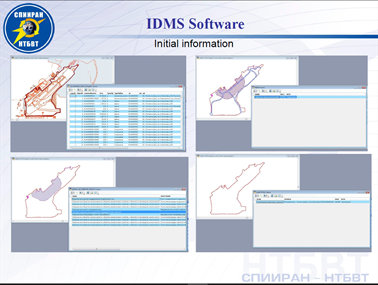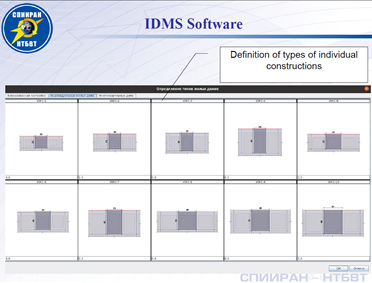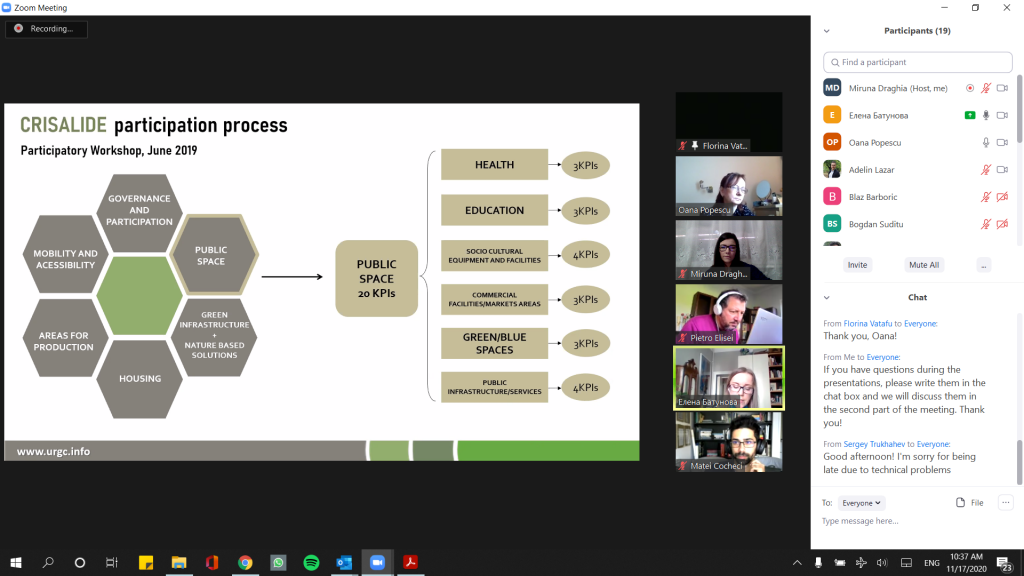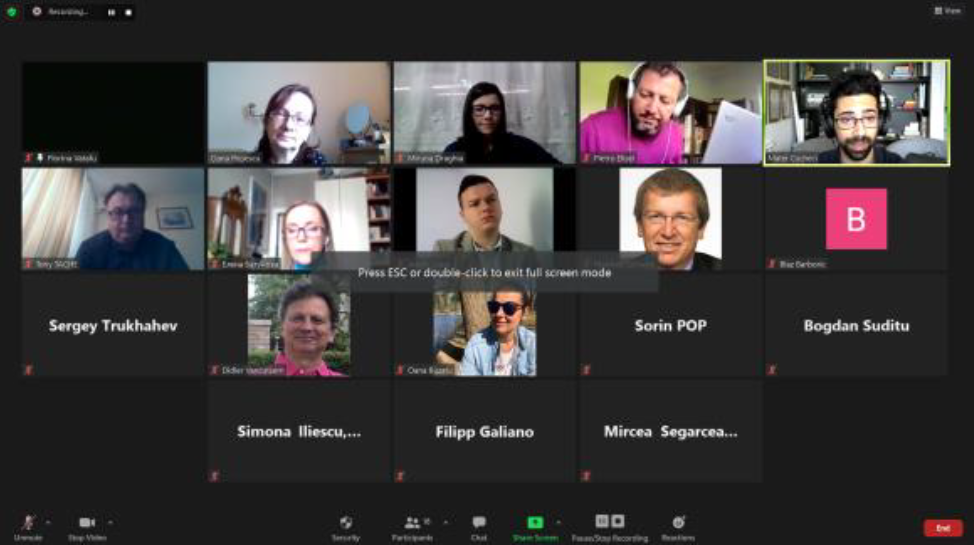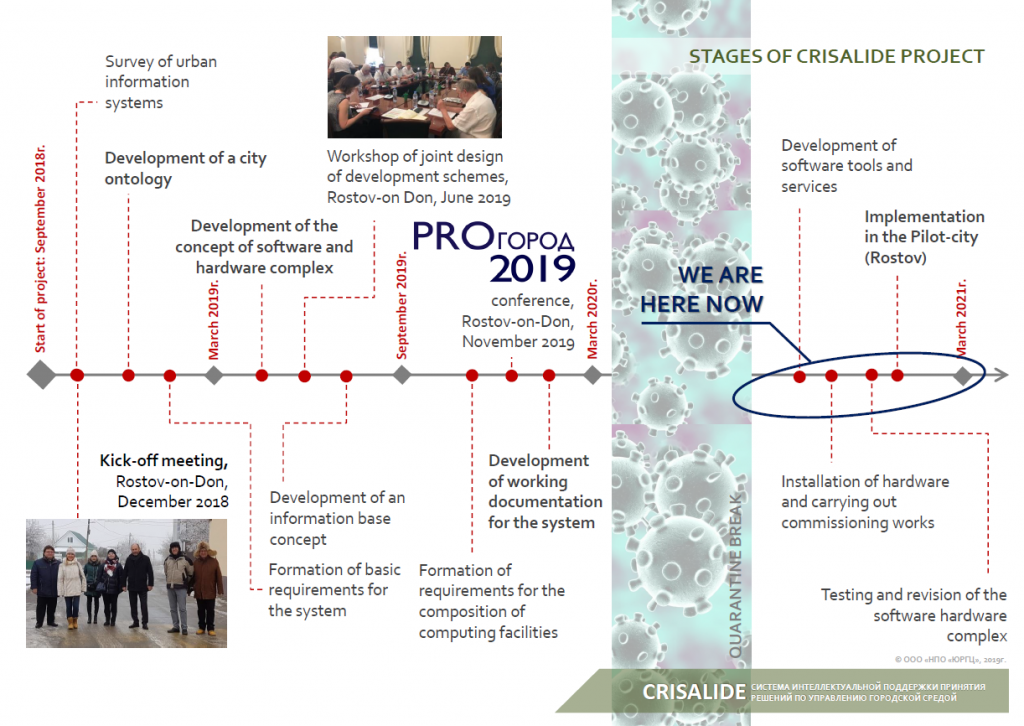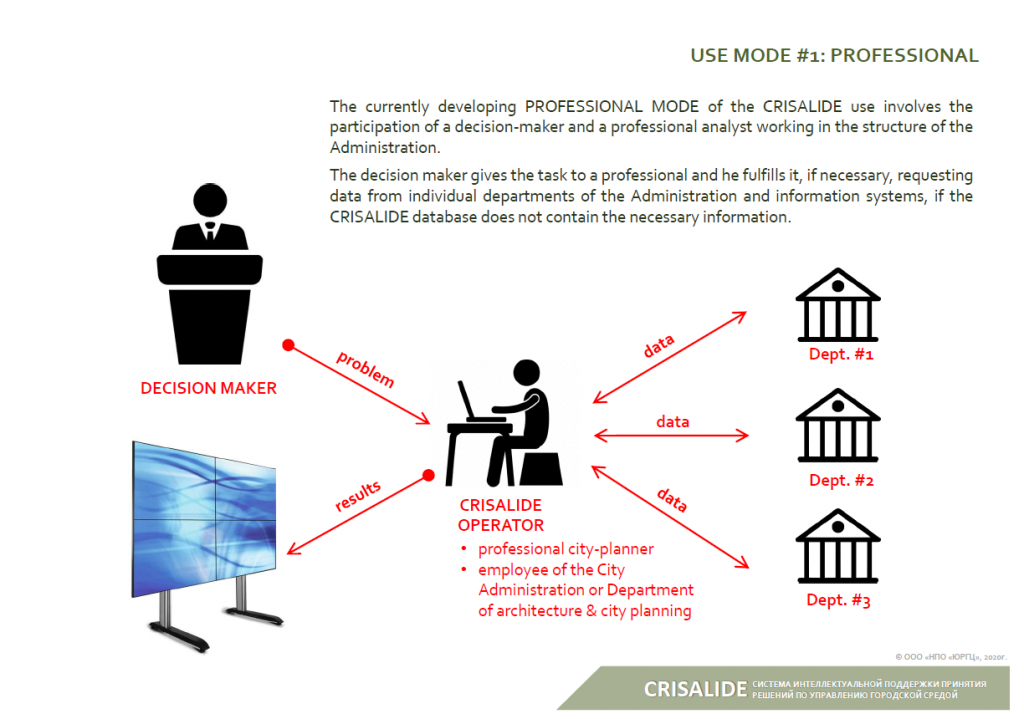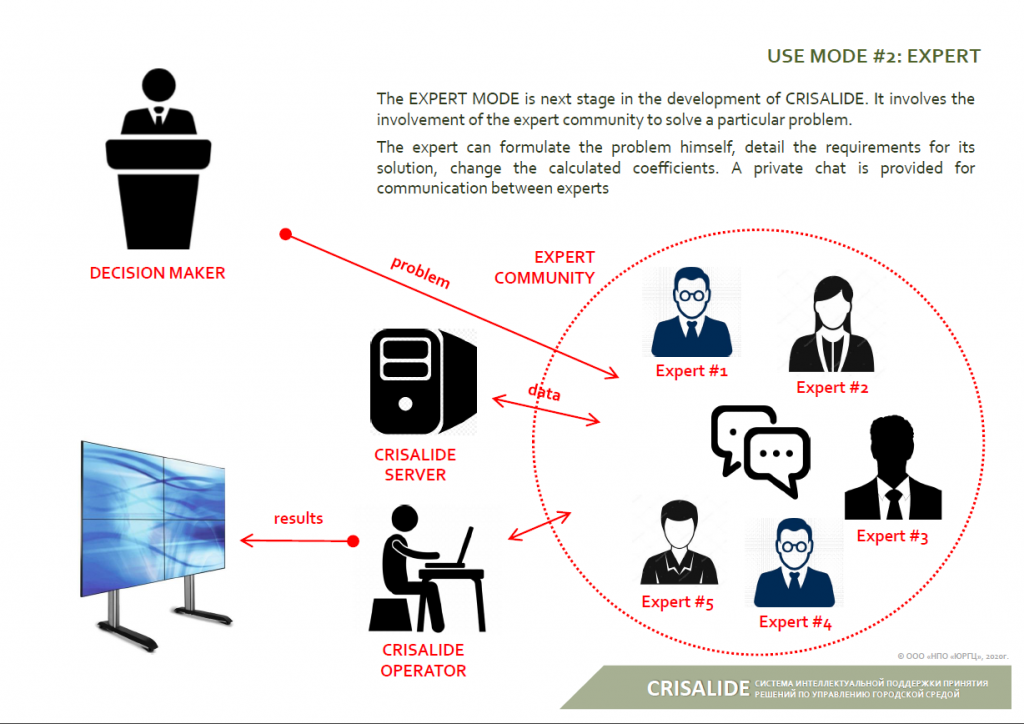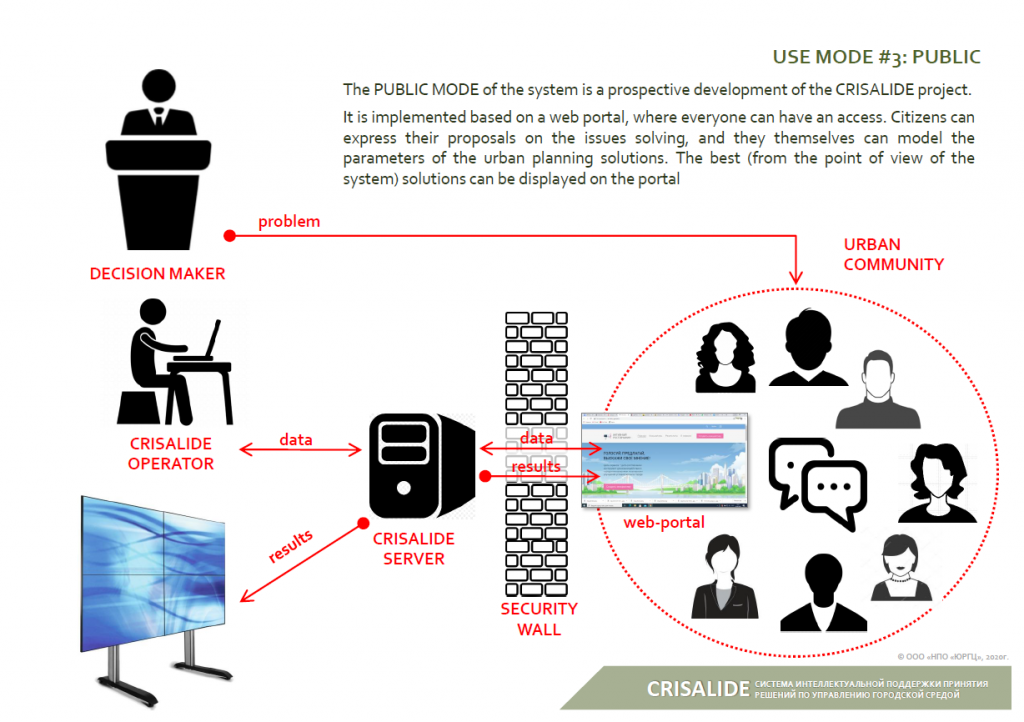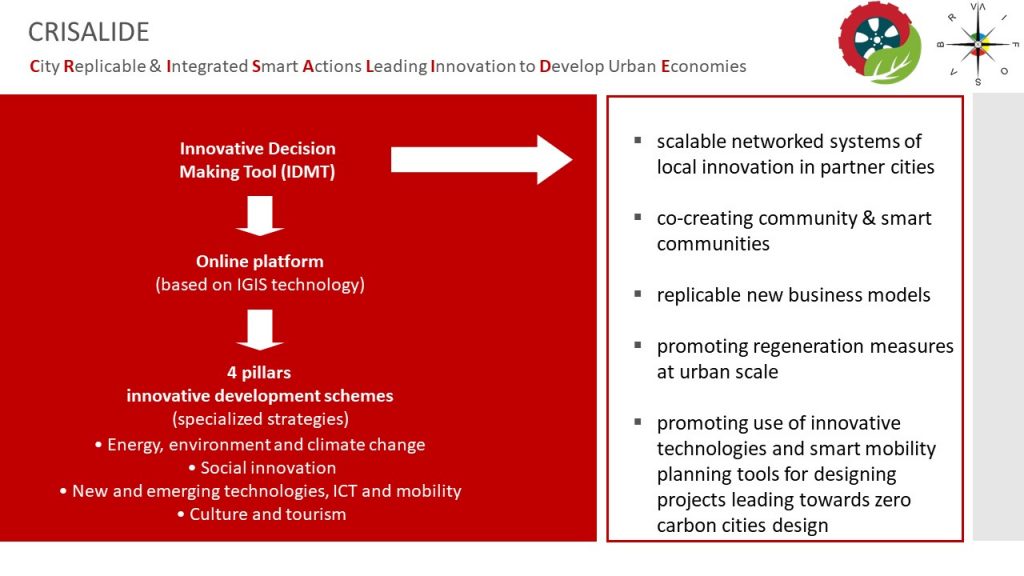Project title: CITY REPLICABLE & INTEGRATED SMART ACTIONS LEADING INNOVATION TO DEVELOP URBAN ECONOMIES
Acronym: CRISALIDE – COFUND-ERANET-RUS-PLUS
Financing: the state budget
Name of the Program in NP III: European and International Cooperation – Subprogram 3.2 – Horizon 2020
Contract duration: 30 month (September 2018 – march 2021)
Contracting Authority: Executive Unit for the Financing of Higher Education, Research, Development and Innovation
Total value of the contract: 390,966.00 lei (representing EUR 84,994.00) of which on financing sources:
Source 1 – from the state budget: 270,236.00 lei (representing 58,747.00 EUR)
Source 2 – from other attracted sources (own financial contribution): 120,730.00 lei (representing 26,247.00 EUR)
Source 3 – from the European Commission: 0.00 lei (representing 0.00 EUR)
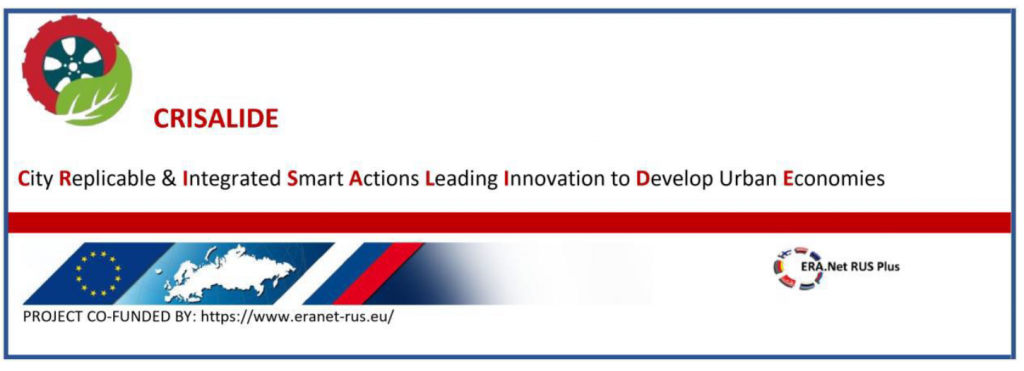
The CRISALIDE project focuses on implementing a long-term collaboration in the field of research and innovation among researchers, companies (technology providers) and the public sector, by developing and introducing a Decision Making tool. The members of the RU, RO, A, GR consortium from the Era.Net Rus Plus area are qualified experts (researchers, planners and technology developers) who will ensure, through the planned activities, a good implementation of the project. CRISALIDE, through its methodology and the organization of participatory activities, will develop a stable and captivated group of stakeholders, which will help establish innovative development schemes (SDIs) in four different areas: energy, environment and change. climate; social innovation and information communication technologies, new and emerging technologies; information and communication technologies (ICT) related to tourism, agri-food and cultural heritage activities.
Based on innovative development schemes, stakeholders can find new partners with similar interests to implement research and development (R&D) projects. Thus, the IDS will represent the basis of the online collaboration platform (IDMT), which will ensure the sustainability of the project due to the constant processes of matching the interests between the stakeholders, and the decision-making processes. Expected results of the project include: the creation of an involved network between stakeholders, an efficient IDMT platform and a greater number of collaborations in the field of research, development and innovation. The results and impacts of the project are divided into three different areas at the level of innovation:
- organizational innovations (such as new niches for the local private sector, a private sector to support research, development and innovation activities, a major political impact for strengthening local and national policies related to research, development and innovation collaborations) ,
- technological and social innovations (improving local identity to increase social capital, raising community awareness of climate change and environmental issues to improve community preparedness, raising awareness of ICT development to enhance the local economy).
Objectives of the CRISALIDE project
Develop a decision-making support system for urban management, which will be used by representatives of national public authorities and local governments, businesses and organizations, as well as by actors engaged in sustainable development, social innovation, information technology and method-based communications modern intellectual property and geo-information systems to improve the efficiency of urban management and reduce planning costs at different levels.
The main results of the CRISALIDE project
- Promoting integration by supporting balanced capacities for cooperation at all institutional levels and stakeholders, and combining results into a single governance tool that promotes innovative services and products.
- Implementation of joint actions, supporting the participation of local groups in urban space planning, by capitalizing on and exploiting products and services related to the use of ICT and knowledge of the economy related to products and services.
- improving the knowledge and skills within the city involved regarding the project theme and the opportunity to learn valuable information from the transnational network to be created, for future projects;
- Gaining valuable experience and developing know-how in supporting participatory projects through electronic platforms and setting up a database of cities in a way that is accessible to the public and especially to city users and tourists;
- Development of experimental areas focusing on public space, services offered and hybrid participation, and replication / improvement of methodology and innovations at local level in other public spaces or on a larger scale, through the transfer of knowledge to urban planners and specialists in e-city.
- Regarding stakeholders, developers, investors, institutions, to think outside the traditional, basic schemes on various topics of urban development and to adopt new methods and tools for improving local activities and development.
- Implementing the public policies that are needed to cover the project theme and the two fundamental challenges: Creating innovative knowledge and tools that generate sustainable and efficient management models;
- Access to funding schemes, and new business models in the field of research, development and innovation (RDI).
- Improving accessibility and promoting social cohesion.
IMPLEMENTATION OF THE CHRYSALIDE PROJECT
Within the project, the partner SC URBASOFIA SRL is responsible for the following activities:
Stage 1. Initiation of the project and establishment of the research structure
- Act. 1.1 – Research coordination – development of the research manual, which contains methodologies, processes for conducting and implementing activities (WP1_1.2). Urbasofia contributes to the development of the workforce and is responsible for developing the Methodology for organizing the participatory workshop in Rostov-on-Don.
- Act. 1.2 – Office research and analysis of the local context (WP2_2.1). Urbasofia contributes to the preparation of the Interim Report of the analysis of the local context (from the social, political, economic, urban and stakeholder point of view).
- Act. 1.3 – First consortium meeting, project initiation. Urbasofia participates in the first official meeting of the project and contributes to the dissemination activities and participates in technical-scientific events.
Stage 2. Intermediate stage – formation of innovative development schemes (IDS) and design of the IDMT platform (innovative decision-making tool)
- Act. 2.1 – Office research and analysis of the local context (WP2_2.1). Urbasofia contributes to the realization of the Final Report of the analysis of the local context (from the social, political, economic, urban and stakeholder point of view).
- Act. 2.2 – Participatory workshop with local actors (WP2_2.2). Urbasofia delivers the final version of the Methodology for organizing the participatory workshop in Rostov-on-Don and participates in the creation of the Tree of Local Problems.
- Act. 2.3 – Co-design of innovative development schemes (IDS) for the formation of the IDMT platform (WP2_2.3). Urbasofia will support the organization and implementation of the local workshop in Rostov-on-Don, in order to formulate the pillars (IDS schemes) for the foundation of the IDMT platform. Urbasofia also contributes to the realization of IDS schemes based on the information accumulated within the participatory workshop.
- Act. 3.2 – Design Guide for the IDMT platform, an innovative decision-making tool (WP3_3.2). Urbasofia contributes to the development of the guide by preparing a report of good practices and a recommendation for the combination of the most appropriate processes that can be adapted to the local context of the city of Rostov-on-Don.
- Act. 5.2 – Capitalization and transfer of results (WP5_5.2). Urbasofia contributes to the realization of the first scientific article, by elaborating the concept model and the hypotheses of the CRISALIDE project. Also, Urbasofia will participate in the consortium meetings and will support in the communication and dissemination activities of the project.
Stage 3. Final stage – capitalization and transfer of results
Stage 3. Final stage – capitalization and transfer of results
Act. 1.2 – Office research and analysis of the local context (WP1_1.2). Urbasofia contributes to the realization of the project process methodology, with a clear description of the steps of the CRISALIDE project.
Act. 4.2 – Adaptability of IDMT (WP2_4.2). Urbasofia will contribute to the preparation of the Guide to the adaptability and replicability of the innovative decision-making tool – IDMT for other stakeholders.
Act. 5.2 – Capitalization and transfer of results (WP5_5.2). Urbasofia will organize a capitalization event, demonstrating the functionality of the IDMT platform in Romania, for disseminating the results to a wide audience. Also, Urbasofia will contribute to the creation of the scientific article and other communication and dissemination support activities.
FIRST STAGE OF THE PROJECT (SEPTEMBER – DECEMBER 2018)
The first stage of the project (2018) is characterized by various analytical and cognitive activities (participation in the Kick-off meeting, realization of the research structure and methodology for the participatory workshop to be organized in 2019 in Rostov-on-Don, initiation preparation of local context analysis). In this first step, different methods of analysis, applied research, knowledge transfer are pursued in the city involved (Rostov-on-don) to understand at a deeper level the urban context and to achieve the objectives set by CRISLAIDE. The objectives of the first stage are closely related to the objectives of the CRISALIDE project and the objectives of the program and aim to promote, disseminate project values and establish a structure necessary for the proper conduct of the project in an international environment. Preliminary results made by URBASOFIA:
- Participation in the initial conference (CRISALIDE Kick-off Meeting) was organized in Russia, in the city of Rostov-on-Don, an international event with participants from the public, private and academic spheres. The conference was entitled ‘Digitalization of urban planning and management’, during which Dr. Pietro Elisei, general manager of URBASOFIA, gave a presentation entitled: Innovation & The City: Contemporary planning processes design as a driver of sustainable development.
- Participatory Workshop Methodology – the methodology contains theoretical components related to participatory planning, as well as participatory methods and tools, providing potential scenarios and directions (including templates for materials to be used in other project activities) to facilitate and conduct Participatory workshop in Execution Stage 2/2019. This activity together with the Interim Report of the analysis of the local context is performed in 80% in the first stage and will be completed at the beginning of 2019. Due to different contractual requirements at national level, the activities provided at project level during this period were delayed. regarding the establishment of common research bases and directions at the level of the whole consortium.
- Interim report of the analysis of the local context – is a documentary analysis at the level of Rostov-on-Don (Russia), which consists in the critical analysis of data and information, both at the level of social, economic, political and urban perspective .
- The structure of the CRISALIDE Research Manual – is the content and the introductory and intermediate part of the Research Manual, in order to establish a common understanding on the development of the research and the definition of the terms and concepts with which the project operates. During the CRISALIDE Kick-off Conference, the members of the consortium established and finalized the structure with the contribution of all partners.
Link Scientific and technical report in extension on the implementation of the CRISALIDE project in Execution Stage 1/2018: https://www.dropbox.com/s/ynk8kl8fpukwxyy/181205_Raport%20stiintific_FINAL.pdf?dl=0
SECOND STAGE OF THE PROJECT (JANUARY – DECEMBER 2019)
Realization of a Workshop “The context of the pilot city: Map of local actors and the structure of the Tree of local problems”. The workshop is part of the second stage of the CRISALIDE project and its main objective is to discuss the activities related to work package 2 (WP2 – IDS Research and Development).
fulfilling clarified aspects (tasks, results and outcomes) in order to achieve the specific objectives. The meeting was organized by the Romanian partners (INCD URBAN-INCERC and URBASOFIA) with the participation of the Russian partner UPC, represented by Elena Batunova.
Link to the meeting minute: https://www.dropbox.com/s/tfibr68iptu4tni/Report_on_CRISALIDE_meeting_in_Bucharest_final.pdf?dl=0
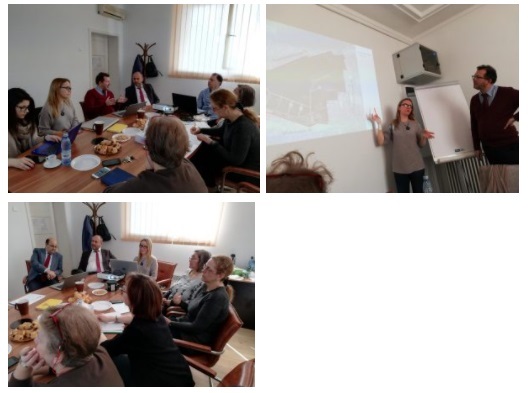
SECOND STAGE OF THE PROJECT (JANUARY – DECEMBER 2019)
The second stage of the project had, mainly, a character of deepening the documentation on the pilot area and on the relevant local actors in the urban planning process, having as main results the organization of the participatory workshop and the preliminary realization of the IDS and IDMT tools. During 2019, the partner URBASOFIA met the proposed objectives and successfully implemented the activities of the CRISALIDE project, contributing mainly to: research and detailed analysis of the local context (Rostov-on-Don and the former Airport Pilot Area), organized and participated in meetings to identify local issues facing the city / pilot area (local issues tree), participated in workshops to define the co-design methodology of the innovative decision-making tool (IDMT) and to define smart indicator matrix (IDS), which will be used later in the design and implementation of IDMT.
Preliminary results made by URBASOFIA:
- Realization of a Workshop “The context of the pilot city: Map of local actors and the structure of the Tree of local problems”. The workshop is part of the second stage of the CRISALIDE project and has as main objective the debate of the activities related to work package 2 (WP2 – IDS Research and Development) and the clarification of tasks and anticipated results in order to achieve specific objectives and identification of stakeholders and problems. and challenges in the pilot area. The meeting was organized by the Romanian partners (INCD URBAN-INCERC and URBASOFIA) with the participation of the Russian partner UPC. During the meeting, the partners agreed on the structure of the IDS Schemes, agreeing that they be made up of a series of SMART indicators for each of the 8 established areas, namely: Housing, Mobility and Accessibility, Environment, Landscape and Public Space, Social Perception ( comfort, safety and security), Commercial Activities and Local Economy, Cultural Heritage, Governance and Awareness and Sustainability. Therefore, a set of at least 5-6 Key Performance Indicators was compiled for each domain.
- Link to the meeting minute: https://www.dropbox.com/s/tfibr68iptu4tni/Report_on_CRISALIDE_meeting_in_Bucharest_final.pdf?dl=0
- Realization of the participatory Workshop organized in Rostov-on-Don – presents the way of the participatory workshop, organized in Rostov-on-Don, between 14-18 June 2019. The main objective of the Participatory Workshop is to bring together the decision makers local, from different sectors, with different interests, in order to present the concept proposed by the CRISALIDE project and to identify major urban problems and challenges, on stable areas of intervention within the partnership, at the March 2019 meeting in Bucharest. The workshop also considered discussing future needs, opportunities and opportunities for collaboration and providing a strategic agenda to address further changes in the established and validated areas of intervention.
- Development of the Design Guide for the IDMT decision support tool – which is a Design Guide for the IDMT decision support tool, which substantiates the activity of technical implementation of the IDMT tool (Responsible partner: UPC, with the contribution of URBASOFIA). Within this deliverable, the partner URBASOFIA created the structure and the introductory part of the guide, to ensure an integration between the research part materialized by IDS (on each of the 8 established planning areas) and the technical interface of the IDMT platform, which will function as a tool for urban space management. Therefore, the innovative decision support tool is represented by an online platform (based on a smart GIS system) and functions as a collaboration platform between specialists – researchers, technology providers at any level in the field of research-development-innovation, representatives of public authorities.
- Carrying out a study that will be the basis for conducting the IDMT replication study (deliverable 4.4., Planned for stage III) starting from the technical structure and functionality of the IDMT proposed by the IDMT Design Guide subsequently transformed into the technical tool (software) decision support. Thus, the deliverable 4.4 related to the work package in question, Guidelines for the replication of the IDMT instrument, will be in the middle of 2020.
- Constant activities of communication and dissemination of activities and partial results by participating with published articles and oral presentations at the following events:
- REAL CORP Conference – 25th International Conference on Urban Planning and Regional Development in the Information Society (Karlsruhe, 2-4 April 2019);
- Conference and Round Table – 15th Edition of the Research Conference in Constructions, Architecture, Urbanism and Territorial Development (Bucharest, May 29, 2019);
- ISOCARP Congress – 55th ISOCARP World Planning (Jakarta / Indonesia, 9 -13 September 2019);
- EURAC Conference – 3rd International Conference on “Smart and Sustainable planning for cities and regions” (Bolzano, 9-13 December 2019).
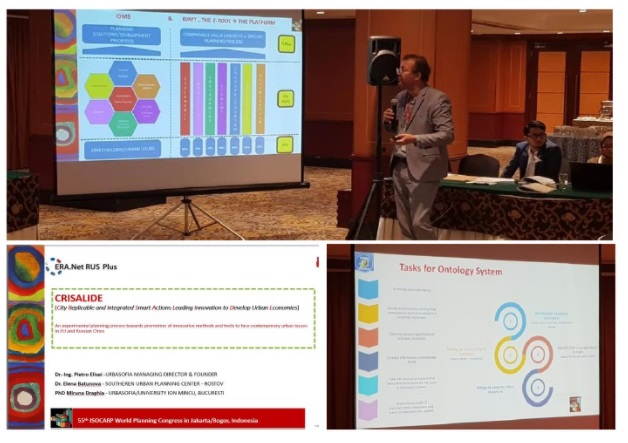
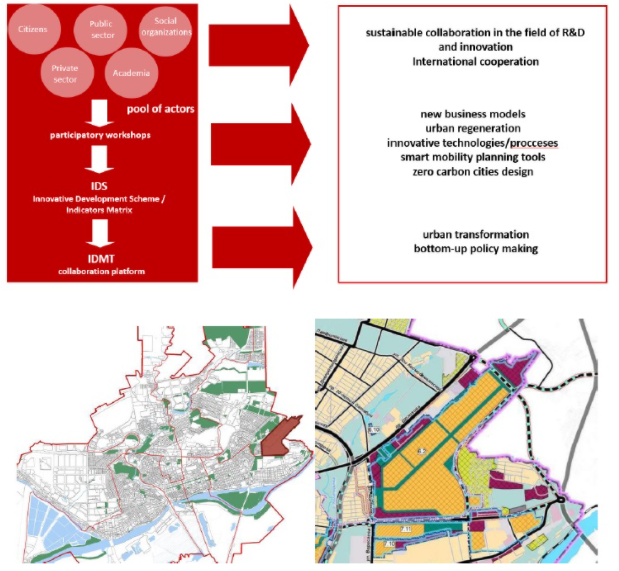
THIRD STAGE OF THE PROJECT (JANUARY – DECEMBER 2020)
The third stage of the project (12 months: 01. January – 31. December 2020) has as main objective the capitalization and transfer of the results obtained in the CRISALIDE research project to the target group, through a series of events, as well as by finalizing the report on opportunities for replication of the IDMT instrument. The specific objectives of this stage are:
- Organizing an event to capitalize / capitalize on development ideas within the CRISALIDE project (transnational conferences organized by project partners in Romania, Austria and Greece), which will ensure the proper dissemination of project results and improve research and development, by addressing and involving different parties interested in areas such as: urban planning and development, social innovation, information and communication technology);
- Final development of the deliverable 4.4 IDMT: Guide for the adaptability and replication potential of the IDMT tool (replication guidelines, on the methodology and opportunity of replication of the IDMT tool developed within the CRISALIDE project), in a broader context.
- Participation in various networking events / conferences, in order to share the results of the CRISALIDE project to a wider audience (Participation in the REAL CORP Conference, Aachen / online, 15-18 September 2020)
Printre principalele rezultate obținute în cadrul proiectul CRISALIDE în etapa a treia se numără:
- Completion of the Guide for the adaptability and replicability of the IDMT tool (Innovative decision making tool IDMT: Guidelines for Replication). The guide contains information on the functionality of the IDMT tool, the possibilities of use and areas of interest, the concept of replication and the benefits it brings, as well as the proposed methodology for replication. The deliverable was developed based on initial directions for the development of the IDMT tool replication perspective, discussed and agreed during implementation stage 2 (2019), but taking into account, at the same time, the latest software version of the IDMT decision tool.
Among the main results obtained in the CRISALIDE project in the third stage are:
Completion of the Guide for the adaptability and replicability of the IDMT tool (Innovative decision making tool IDMT: Guidelines for Replication). The guide contains information on the functionality of the IDMT tool, the possibilities of use and areas of interest, the concept of replication and the benefits it brings, as well as the proposed methodology for replication. The deliverable was developed based on initial directions for developing the perspective of replication of the IDMT tool, discussed and agreed during implementation phase 2 (2019), but taking into account, at the same time, the latest software version of the IDMT decision tool.
- Organizing the first capitalization event in Romania, by the partners URBASOFIA and URBAN INCERC (Virtual workshop on the Innovative Decision-Making Tool and its Replication Modalities). The event was organized in the form of a Focus Group, the discussions being focused on the Innovative Decision Making Tool (IDMT) developed by the project partners and the ways to replicate this model. The purpose of the virtual workshop was to bring together specialists in the field of IT / software development and the development and implementation of decision-making tools, with experts in spatial planning at various territorial levels (from national to local level).
- Publication of the article entitled Decision Support System Design as a Method to Enhance Public Participation in Urban Development: The CRISALIDE Project, Rostov-on-Don, to which URBASOFIA contributed as co-author, together with the other partners of the CRISALIDE project. The article was published in REAL CORP 2020 Proceedings.

